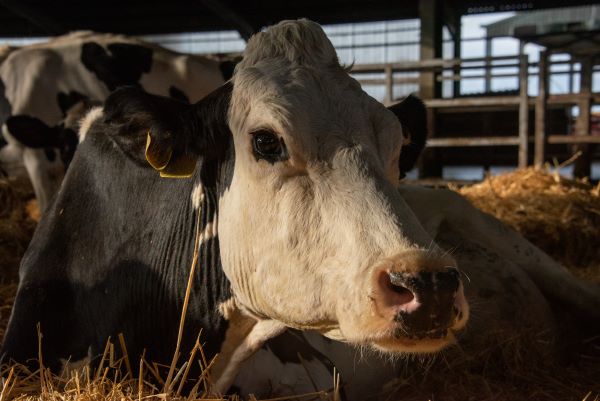An ordinary dairy cow becomes the most unlikely star of Andrea Arnold’s insightful documentary. When we first meet Luma, she is giving birth to a black-and-white female calf that tumbles out of her onto the floor of a barn, at which point the mother starts licking her offspring clean. Though the scene may sound tender, it is also full of bodily fluids and heavy, wet sound effects, making it more clinical than anything else.
Though the pair bond for a time, it’s cut short by cattle farmers who spirit the calf away, leaving Luma wandering her pen and mooing loudly and endlessly. Are they the wails of a besieged mother calling after a lost child? We may never know for sure what the animal is actually thinking at any given moment, but the more we stare at her—and there are a lot of lingering shots, focusing on her face and particularly her eyes—the more we can’t help but project our feelings and empathy onto her.
The film jumps back and forth between Luma and the nameless calf, which grows up before our eyes while remaining always identifiable, thanks to an ear tag with a serial number. (Filming on this project took place across six years.) Luma receives more screen time of the two, but also has the weightier story line as she gradually emerges from listlessness. Her day-to-day existence may not be eventful, consisting largely of being regularly hooked up to a milking machine, yet what does happen to her—most notably, she becomes pregnant again—is the closest the film has to a plot development.
At its best, Cow manages to immerse us so fully in the mental space of its titular subject. Arnold frequently films Luma from behind and over one shoulder, which might be the closest one can get to a first-person perspective. In addition, the director makes the wise decision to keep any humans at arm’s length—none are on-screen long enough to leave much of an impression—resulting in Luma and her calf becoming the only protagonists viewers have to connect with.
The only drawback to becoming emotionally invested in Luma is that, as the farm’s property, she is frequently a passive victim without any recourse for what viewers may perceive as the injustices heaped upon her. Arnold, whose specialty to date has been gritty immediacy without sentiment—see her Oscar-winning fictional short Wasp (2003) or the riveting Fish Tank (2009)—traces Luna’s lifespan to its most logical, and tragic, conclusion without attempting to take an off-ramp to someplace reassuring. In short, the film is pretty bleak, though there are at least a few moments along the way in which the bovine may experience something akin to contentment: an evening spent grazing under a twilight sky or a brief coupling with a stud bull.
There are times in which the constant cutting to Luma’s calf come across as unnecessary padding, yet these scenes prove vital. For one, watching the calf frolic in grassy fields provides a counterbalance to the endless footage of Luma largely trapped indoors. Without them, Cow could very well have been a slog all the way through.
Perhaps more importantly, what becomes evident by the denouement is that the two story lines add up to a complete life, which consequently implies Luma’s calf’s fate is to live a life just like hers. It’s all very poignant, though not likely to provide much solace to those who walk away from the film viewing Luma’s life as full of traumatic loss.







Leave A Comment